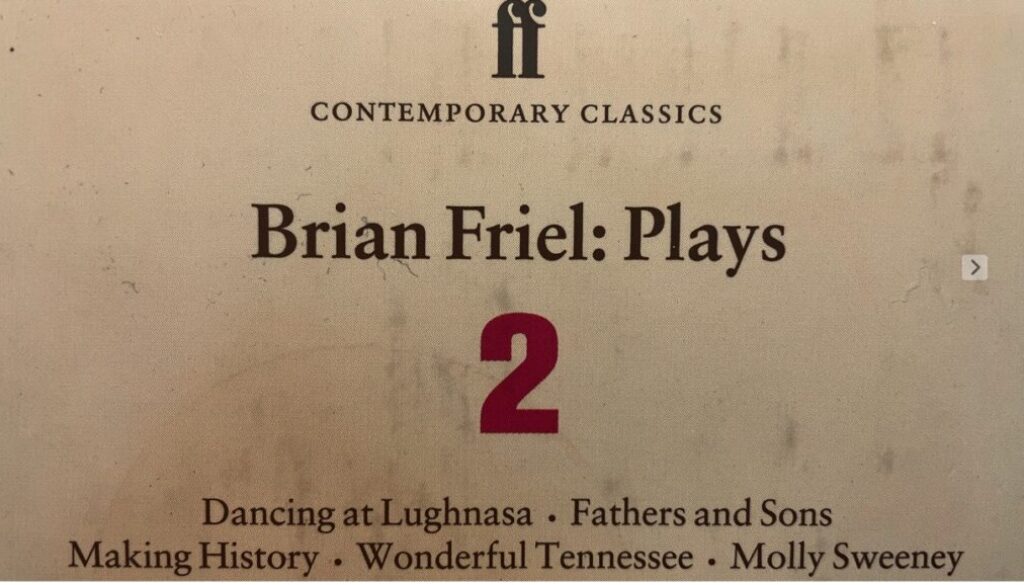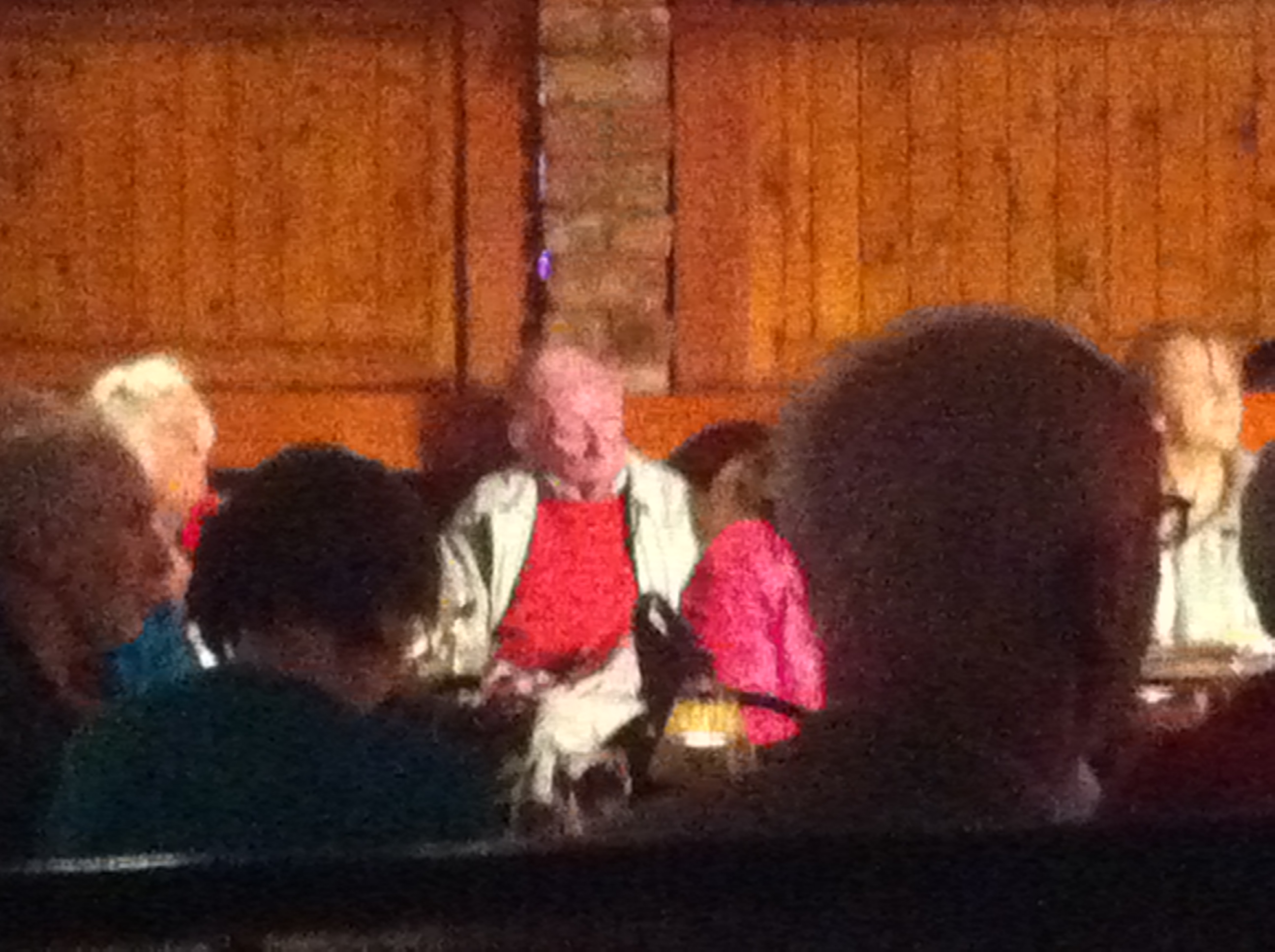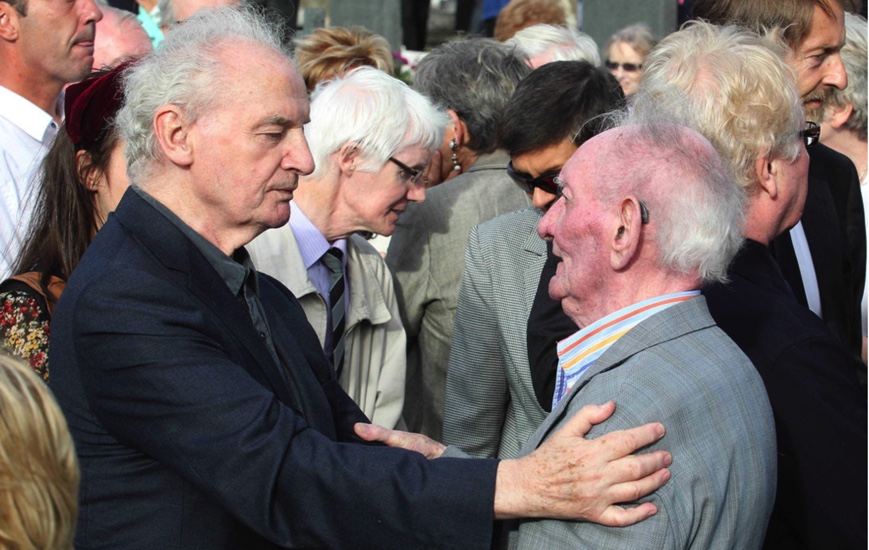When Brian Friel appeared
Nowhere to be seen
Macklin festival patron
The opening event was a book launch and its author, Sean Beattie, referred to Brian Friel by stating that the playwright had been good enough to have attended the first Macklin festival, eventually becoming its patron. ‘He usually makes an appearance at some stage over the weekend’ said Sean sheepishly alluding to the fact that Friel was still nowhere to be seen.
Friel hadn’t been seen at his friend Seamus Heaney’s funeral in Dublin, nor at the MacGill Summer school in Glenties which he never misses. At 84 and in poor health, it looked as if the man had the good sense to stay put and get an early night.
Fashionably late
A break in the formalities allowed more chat and some of Sean’s books to be sold and signed to the sounds of a local traditional group of musicians. At the recommencement, I looked around the room and there he was right in front of me. Looking frail and older than I’d remembered him, Friel sat across the room with his wife Anne, listening to the speeches. Friel didn’t have to be there; it was more of a courtesy to the organisers. He’d travelled from Greencastle as he had on the opening night without fail for 24 years. The speeches carried on and Friel combined listening to them with reading a copy of Sean’s book he had on his lap.
More references were made to Friel and even a round of applause was offered at one point. Friel carried on reading, oblivious to it all. Just like Philadelphia’s Gar, there is a public and a private persona at play here. In private, Friel is renowned as a great wit, full of stories and gossip and fun. In public, he runs a wary gauntlet, unsure of who will accost him or put him straight on how he should have done such and such.
The playwright has never enjoyed the limelight, nor is he prone to speeches, interviews or indulging in the fame game. His craft has made him world famous. Much and all as I’d always hoped he would win the Nobel Prize, I’m glad he hadn’t that day. Instead, the new 2013 Nobel Laureate, Alice Ann Munro, was being harangued in Canada by the media frenzy while Friel was able to keep a long-standing appointment in Culdaff. Outside for some air, I heard an earlier speaker telling a young publisher that she knew Friel well and would he like her to introduce him to the playwright.
The proud curmudgeon
No more Mr. ‘There There’
Heaney’s death was a reminder of just how much we treasure those who can deftly articulate the heartbeat of Ireland. We’d lost the poet so suddenly and the grief felt was genuine – no more Mr. ‘There There’, the avuncular figure who we all felt we knew and who was happy to talk to anyone and everyone. Not so with Friel.
He has admitted to being a proud curmudgeon, one who prefers to let his plays do the talking for the most part. Few get to have a one-on-one with Irish literature’s most reluctant hero. For years to come however, we will be able to enjoy nights in the very intimate company of Friel and his words of solace and truth as the public Friel meant them to be – on stage with actors bringing his vision to life.
In touch with some otherness
A woman awkwardly stopped Friel to get her photo taken with him and he obliged – a stoney demeanour to her thumbs ups glee. The publisher of course never got to meet him. I managed to see his stick sway around the door as he made his way out of the room. As quietly as he’d come in, he was off into the night with his beloved Anne; his work was done and he was gone. ‘Elvis has left the building’ I said to my gossiping friend as I nodded towards the door. Where Macklin nearly saw 107, Friel probably won’t see 87. His time will come soon and the tributes and praise will come thick and fast about his legacy.
I’ll remember the grace of an old man with a sore leg and a stick keeping up a tradition, but time and again in years to come, I’ll remember the numerous moments where his words held me spellbound in their sublime elegance:-“[d]ancing, as if language had surrendered to movement…as if this ritual, this wordless ceremony, was now the way…to be in touch with some otherness. Dancing as if the very heart of life and all its hopes might be found in…those…movements. Dancing as if words were no longer necessary.”
When Friel, patron of the Macklin festival died in 2015, so did the festival, but there was one last Macklin event at the very site where Macklin is buried in London’s West End in November 2015: Macklin, the final farewell.
Find out more about the Mundy’s/McLoone’s house from Dancing at Lughnasa from our Donegal’s Hallowed Sites Spotify playlist
Visit the Brian Friel Digital Archive
Henri Matisse. The Dance, 1909-1910. Oil on canvas, 8’6″ by 12’10”. Hermitage Museum, St. Petersburg, Russia.








There’s no place like home | Racontour
April 27, 2015 @ 3:01 pm
[…] ‘The Last of the Name’ is a book by local man Charles McGlinchey that is well-loved for good reason. It captures a time long since gone around Clonmany as told to local teacher Patrick Kavanagh by McGlinchey and has been graced with local artists helping the project gain greater prominence in the last twenty years. On Saturday afternoon, words, songs and images combined to tell us the story of McGlinchey in a innovative and well executed performance by Finbarr, Seamus and Grace with Paul Kelly in the place of McGlinchey. Kavanagh’s son, Des was in attendance as was the patron of the festival and the book’s editor/writer of its introduction, Brian Friel. […]